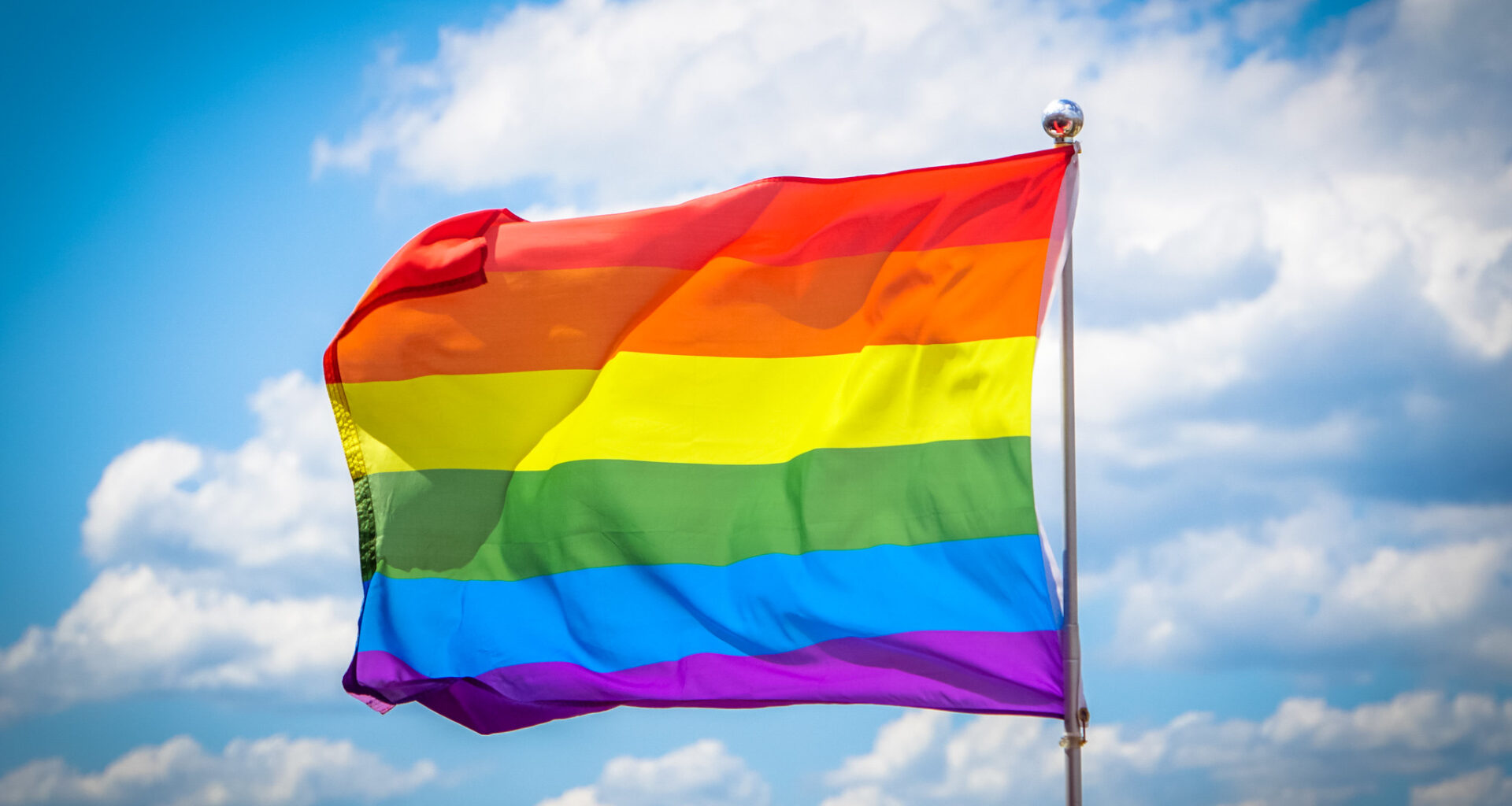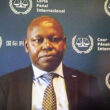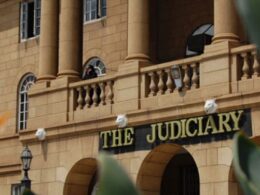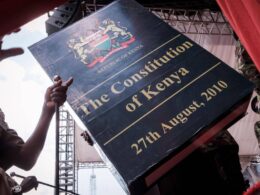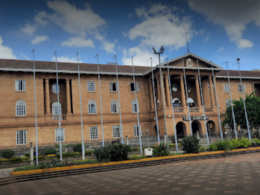By Susan Kendi
“…They are lucky to see a queer person in the flesh and going about my business. Queer as I came, queer as I live,” – Wallace Nderu.
As the world held the three-day Generation Equality campaign, which advocates for equal opportunities and rights for women, ICJ Kenya reflected on how the rights of the sexual minority groups can be safeguarded to enable them to live their truth without fear or intimidation. Trending with the hashtag #ActforEqual, the Generation Equality campaign began on June 30, the last day of Pride month. Pride month is set to primarily recognise, promote and increase the visibility of LGBTQ+, which is an acronym for Lesbian, Gay, Bisexual, Transgender, and Queer groups.
Along those lines, we had an in-depth conversation with Wallace Nderu, who is an Advocate of the High Court of Kenya, and identifies as queer gender non-conforming, to share his personal story, and told us the challenges he experienced and how he rose above it all.
At the tender age of five, Wallace said he discovered that he was uniquely different; and would say he came in the “wrong body,” that of a boy.
Growing up, whenever they played house with his childhood friends, the play would always begin five minutes late. This was because as they were assigning household duties, he would be assigned the role of an uncle. He would rebuff the idea because he passionately wanted to play the role of an aunt. His friends would always question why he wanted to take up the role of an aunt, whereas he was a boy, but they would give up and let him be. Wallace would then go back to the house to get his ‘leso ’(a wrapper clothing) then gladly play the role.
Playing feminine roles was not the only thing that excited Wallace. He also enjoyed wearing dresses.
“My gratification always came when I used to wear my cousin’s dresses every Sunday morning as we were being prepared for Sunday school. I used to be so happy, and even my late mom could tell my happiness was drawn when I used to wear dresses because that is when I felt complete,” he said.
While in school at standard seven, he bumped into a newspaper article speaking on ‘gender identity disorder.’ He immediately related to what they were discussing. Having clocked teenagehood, he related with the story. However, he never understood why they referred to queerness as a disorder and, worse still, not offer a cure for it since almost every disorder has a cure. Despite this, as an adult, he got to recognise and appreciate that the article’s writers then had limited information on LGBTQ+.
“When I hit puberty, I got more attracted to boys. This attraction you can’t hide, and there was this happiness I had every single time I was around this one particular boy who was an ally from the get-go. From a young age, he appreciated this particular difference, and every single time we were together, even in school, I used to feel very happy. That was when I got to appreciate, ‘oh actually Wallace, you know there is this unique difference about you, different from everybody else,” he added.
For 29 years, the majority of Wallace’s friends have been girls. In primary school, he was always in the company of the girls as they practiced cat walking just like runway models. Apart from spending time with girls, his soft voice and mannerisms made boys ask, “Why do you talk like you do?” “Why do you act the way you do?” “Why do you look the way you look?” but his answer was simple, “Well, it is just who I am.”
Having his sexuality questioned is not a new phenomenon; it is part of his daily life. As he was sharing his story, two ladies marketing a gin brand approached us, and one curiously asked, “Are you who I think you are?” and Wallace was quick to respond, “You can say it, I have no problem. But to confirm what you are thinking, Yes, I am queer.” The marketer was thrilled. “I have a lot of friends like you,” she said. After they had left, Wallace seemed unpuzzled and continued narrating his story.
“In high school, I remember boys used to crack some silly harmless jokes like, ‘I thought this was an all boy’s school. So, what is this girl doing here?’ and it was to be very funny, I would always laugh about it,” he shared.
In University and work environment, it was no different. However, no one could personally ask him about his sexuality; they always tried retrieving information from his female friends, who would direct them to address the question directly to him.
Laws outlawing LGBTQ
On May 24, 2019, the High Court of Kenya dismissed a petition seeking to decriminalise same-sex relationships. Petition 150 of 2016 questioned sections 162 (a) and (c) and 165 of the Penal Code of Kenya, which states that “Any person who has carnal knowledge of any person against the order of nature; or permits a male person to have carnal knowledge of him or her against the order of nature, is guilty of a felony and is liable to imprisonment for fourteen years….”
In their written judgment, the three-Judge bench of Judges Roselyne Aburili, E C Mwita, and John M. Mativo argued that “Our view is informed by the fact that we cannot read Articles 28 and 31 in isolation from Article 45(2). Differently stated, unless Article 45(2) is amended to recognize same-sex unions, we find it difficult to agree with the Petitioners’ argument that we can safely nullify the impugned provisions, whose effect would be to open the door for same-sex unions and without further violating Article 159 (2) (e) which enjoins this Court to protect and promote the purpose and principles of the Constitution.”
In a press release issued after the judgment, the Executive Director of the Kenyan National Gay and Lesbian Human Rights Commission (NGLHRC), Njeri Gateru, expressed disappointment on the decision. NGLHRC was the main petitioner in the case.
“Our Constitution, the supreme and homemade law of our land should be respected and upheld as sacrosanct. The Court has missed an opportunity to help ensure a future free from the intrusion of the state in our private lives, and to turn the tide for the LGBT community here at home in Kenya, and on the wider African continent,” said Njeri Gateru.
Kenya is not the only African country that outlaws same-sex intimacy. Out of the 54 African states, only 22 legalise same-sex relationships, with South Africa being the first country in Africa to legalise same-sex marriage in 2006. In four African countries, Mauritania, Nigeria, Somalia, and South Sudan, it is punishable by death.
Discrimination and Maltreatment
Fortunately for Wallace, he has never experienced any form of bullying, intimidation, or harassment. However, some sexual minorities have faced various forms of discrimination and abuse.
In February 2015, two men suspected of being gay were arrested in Kwale County and forced by Kenyan authorities to take anal examinations, HIV and Hepatitis B tests in Mombasa Madaraka hospital. Same-sex intimacy is illegal in Kenya is punishable with 14 years in prison.
The National Gay and Lesbian Human Rights Commission (NGLHRC) filed a case before the Court, citing the tests as “a violation of rights to privacy and dignity and amount to torture.”
“The violating examinations, which include being made to lie with legs up in a humiliating position and having instruments forced into your rectum, are widely accepted to have no medical merit,” NGLHRC added in a statement.
In the 2016 decision, Mombasa High Court upheld the security personnel’s use of forced anal exams with intent to provide evidence of same-sex conduct.
Two years later, on March 22, 2018, a Court of Appeal in Mombasa overturned the High Court’s decision terming the forced anal examinations “unconstitutional.”
In African countries such as Uganda, Zambia, Egypt, and Cameroon, they still conduct forced anal examinations on gays.
In their report, the Independent Forensic Experts Group established that the anal examinations are discriminatory and result in significant physical and mental pain and suffering. They added the examinations constitute cruel, inhuman, and degrading treatment and may amount to torture depending on the circumstances.
“In our experience, ensuring informed consent is almost impossible for examinations based on profound discrimination and criminalisation, where individuals understand that State officials have the power to compel the examination, and non-compliance is likely to result in adverse legal outcomes, ill-treatment, and reprisals. For this reason, anal examinations and other tests targeting “homosexuality” should be presumed to be conducted forcibly and without informed consent,” said the Independent Forensic Experts Group.
This was not the only case of discrimination; in 2015, the Non-Governmental Organizations Board (NGO Board) refused to register NGLHRC, alleging that it promoted immorality. However, the High Court ruled in favor of NGLHRC.
Religion and same-sex relations
In June 2021, United Kingdom’s fourth-largest denomination, the Methodist church, approved same-sex marriages. In a news report by the Guardian, the wedding was supported by 254 to 46 votes.
“The motion required a change to the definition of marriage to be “a lifelong union in body, mind, and spirit of two people who freely enter it,” reported Harriet Sherwood in the article.
According to Wallace, some of the challenges that sexual minorities face come from religion. Religion’s core message should be love and inclusivity; however, people selectively quote a few verses from the Bible to justify their hate.
In his Master of Laws (LLM) Dissertation titled, “Religion, [Homo] Sexuality and Human Rights,” Wallace explored the role the Church can play in protecting and promoting the Rights of Sexual Minorities in Contemporary Africa, providing the case study of Ghana.
“Religion commands masses. Religion dictates the day-to-day lives of people of diverse natures in this particular continent, in this particular country, and it can be used as a platform to change the narrative for queer persons. They have to look beyond what would be deemed the sin because I don’t know who categorised sins and placed homosexuality at the epitome of it all and said it is the most unforgivable thing. But beyond that, the Church can be able to assist and play a role.”
Pursuing his LLM in South Africa, where the rights of LGBTQ+ persons are safeguarded, and then having to travel to Ghana, one of the most religious countries in the world, for his internship and second semester and to write his thesis, was not easy for him especially as a queer person.
“When I was in Ghana, I was a bit scared moving about my business within the campus and the city. I cannot forget the stares I always got when I went to Accra Mall almost every other Friday or Saturday, especially from the men. Because of my mannerisms to include my walking style, my queerness, unfortunately, cannot be hidden. In my head, I was always praying no one approaches me for this. But again, I also told myself that they are lucky to see a queer person in the flesh and go about my business. As a queer person, I am bound to live my life as my authentic self, living my truth unapologetically free of fear.”
In 2020, the Ghana government blocked Pan Africa ILGA (International Lesbian, Gay, Bisexual, Trans and Intersex Association) annual conference after an outcry from conservative religious groups. The conference was to focus on how to increase awareness of LGBTQ and protect their rights across Africa.
Conclusion
ICJ Kenya advocates for equality and inclusion of all people despite their sexual orientation, gender identity, expression, and race.
Quoting John F. Kennedy, “The rights of every man are diminished when the rights of one man are threatened,” and for this, all rights must be respected and protected.





